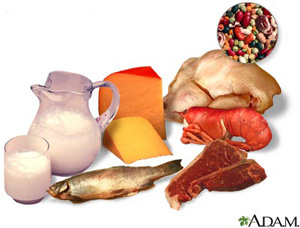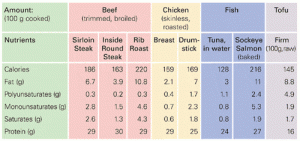 We often hear protein is an important part of a healthy diet. Here I explain what it is, how much you need and the right way to make it a part of your healthy lifestyle.
We often hear protein is an important part of a healthy diet. Here I explain what it is, how much you need and the right way to make it a part of your healthy lifestyle.
What is Protein?
- Found in muscle, bone, skin, hair, pretty much every other body part or tissue
- Makes up enzymes that are part of numerous chemical reactions in the body
- As hemoglobin, it carries oxygen in your blood
- Proteins are built of many amino acids; in which the amino acids come together, form a protein, and take on one its numerous roles in the body. Unlike fats and carbs, the body doesn’t store amino acids, so a daily supply is needed to make new protein.
How Much Do I Need?
This is a much-debated question. It’s recommended to consume a minimum of 0.8 grams of protein for every kilogram of body weight per day. (There are 2.2kg in a pound, so to determine how many kgs you weigh, divide your weight by 2.2., i.e. 150 pounds divided by 2.2 = 68.2 kg. A 150 pound person needs about 55 grams of protein daily). Beyond this recommendation, there’s isn’t that much concrete information on the ideal amount of protein one should consume.
*Notice: this amount is individualized, you’re basing it off your current body weight (therefore, it varies person to person).
Not All Protein is Created Equal.
- Complete proteins- contains all the amino acids needed to build new proteins. Animal sources are mostly complete proteins.
- Incomplete proteins-lack one or more essential amino acids (essential-amino acid the body can’t make or form from another amino acids). Common sources are fruits, veggies, grains, nuts. *This is important for vegetarians! In order to meet your protein needs, you need to eat a variety of protein-containing foods daily.
The Source of the Protein is Important for Good Nutrition. Animal and vegetable proteins have about the same effects on health, however, it’s the package of the protein that determines how healthy it is.
Example: a 6 ounce porterhouse steak will give you 38 grams of protein, but also 44 grams of fat and about 16 grams of saturated fat… not good! Be smart when choosing your proteins. Choose leaner meats, like fish and poultry; lower in fat dairy products, eggs, beans, lentils, whole-grains and nuts. If you can’t completely cut out red meats, try to choose leaner cuts, pay attention to portion size, and consume them in moderation.
Protein and Weight Control.
Eating enough protein helps with weight loss and maintenance for a few reasons:
- High-protein foods are slow moving from the stomach to the intestine = feeling full for longer = eating less and getting hungrier later.
- Protein has a steady, gentle effect on blood sugar
- The body uses more energy to digest protein than to digest fat or carbs.
*Don’t go crazy though and not eat any carbs. Carbs are much needed by the body!


I am enjoying your advice but can u pliz explain abot carbs,which foods cotain high carbs?
Thanks Misozi! Be on the lookout this week…I’m writing up a carb 101 for you. Stay posted 🙂
“A 150 pound person needs about 55 kg of protein daily)”
Uh… that would be a lot to eat (121 lbs).
Hello Jank-
You definitely found a typo and it has been corrected (55 grams).
Brandi